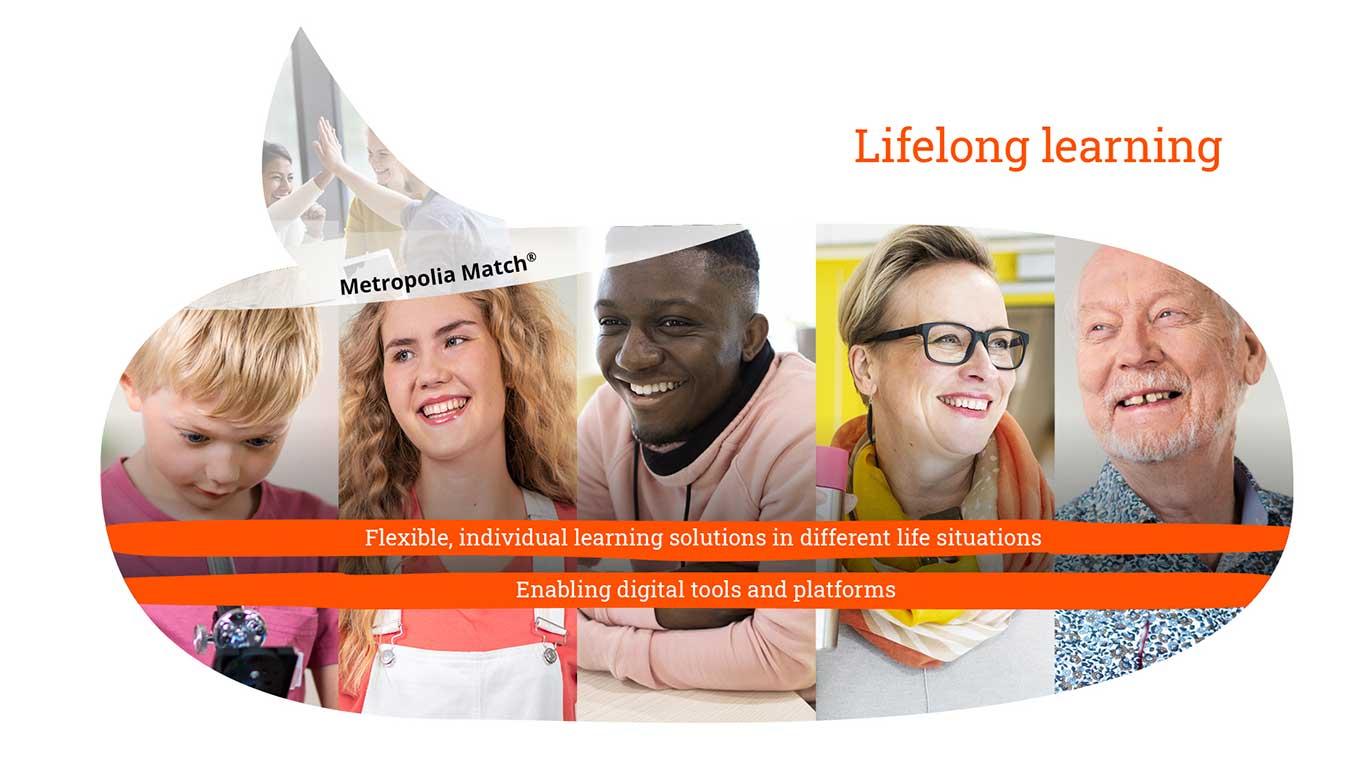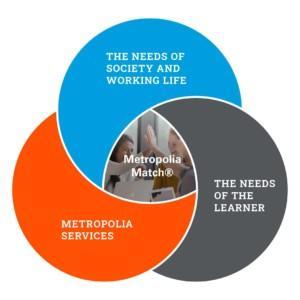Educational provision is available for a large variety of target groups
Metropolia University of Applied Sciences (henceforth Metropolia) offers degree programmes in both Finnish and English at bachelor’s and master’s levels as well as a wide range of programmes aiming at various target groups. Among the latter, there are so-called pathway studies for international students in English to enable them to pursue a higher education degree in Finland. There are also ‘open classes’ for teachers enhancing their professional skills or employees from working life wishing to acquire new skills for their careers.
Degree programmes and other educational provisions are well-described in the study guide on the institution’s website. Samples from these descriptions indicate that Metropolia puts the envisaged competence-based approach into practice, as the intended learning outcomes include not only subject-specific knowledge and skills but also target subject-independent competences, particularly transversal skills. According to the study guide and the self-evaluation report, the learning outcomes comply with national and international standards.
The educational provision at the HEI matches the institution’s strategy and considers working life appropriately. As stated in the audit material, the HEI has renewed its planning process in accordance with its degree regulations and pedagogical principles, which are available on the intranet in Finnish and English. These principles comprise topics characteristic of the higher education institution type, such as learner-centredness, phenomenon-based learning and open-mindedness to manifold target groups. All information on education planning is available on the intranet.
There is very close contact with companies through, for example, external advisory boards, but also strong connections to the owners and the municipalities of the capital area. These close relations ensure that Metropolia offers programmes highly demanded by the local job market, such as in the fields of health and information technology.
The audit team particularly highlights the SIMHE project. A forerunner in the field of education for immigrant students, Metropolia provides not only education but also, for instance, support for working life insertion to this target group. This project is designed with a holistic approach and meets urgent individual and societal needs within a European agglomeration. It may set standards for the successful integration of immigrants into a job market demanding a highly qualified workforce.
The audit team appreciates the ambitious goal to update curricula annually but would advise the institution to reconsider this rhythm after gaining experience with this process. Major adjustments sometimes need time to have a more thorough effect, and considering the degree programmes’ amount and variety of fields, this approach might prove too agile in the long run.
Internationalisation bears a high potential for further enhancing education
The planning process will take account of internationalisation by cooperating with foreign universities and providing educational opportunities for international or immigrant students. Metropolia profits from its extensive network of international partners. According to the discussions with staff, there are approximately 300 institutions. At present, there is no systematic approach to the choice of partners. Still, according to the website, Metropolia is part of various subject-specific networks and is a member of the Urban Research Education and Knowledge Alliance (U!REKA).
The degree regulations name Finnish as the main language of instruction but offer the possibility to arrange for teaching and learning in other languages if complying with the curricula. Finnish classes shall support international students’ integration into society and the job market.
The website features 13 degree programmes in English aimed chiefly at international and immigrant students. The METKA student union actively integrates international students providing all information in Finnish and English. Yet, the audit team sees high potential for internationalisation at home activities involving international students, especially those who are part of the SIMHE programme. More double-degree programmes would also be a valuable tool for creating a more accommodating learning environment for outgoing and incoming students and contribute significantly to creating strategic partnerships with institutions abroad or enhancing already existing ones.
Metropolia’s degree regulations comply with the Finnish National Frameworks for Qualifications (FiNQF). They are available to the public in Finnish and English on the website.
Metropolia’s strong connection with the job market serves as an integral part of education
Students at Metropolia profit from a strong job market orientation, which is an integral part of the HEI type. Each bachelor’s programme comprises an innovation project of 10 ECTS, the so-called MINNO, which can be considered a Metropolia ‘trademark’. Samples from the curricula of the various degree programmes show that the institution ensures the acquisition of transversal competences from the beginning, and various assignments in class help to practice academic working patterns. According to the interviews, staff members sometimes can even link teaching and research and sometimes not. The MINNO project and the HyMy Village (cf. Chapter 2) are particular highlights of a very authentic working life environment.
Students and external stakeholders participate in education planning, mainly on the advisory boards of degree programmes and schools. Discussions during the on-site visit showed that their voice is heard and taken seriously. A concrete example was given concerning distributing certificates by mail during the pandemic, which initially caused additional student costs. It was then taken aback following student complaints at the advisory boards. However, the advisory boards are still a relatively new instrument with a high potential, which is not yet used systematically in all schools and programmes. Metropolia should pay special attention to a more systematic implementation of advisory boards.
The role of the advisory boards may vary as well. The audit team considers that the role of the advisory boards should be defined more clearly, especially since the advisory board members’ involvement in evidence-based enhancement of the programmes bears great potential, which has not been sufficiently used so far (cf. chapter 1.3 as well).
Innovation Hubs, the HyMy Village and the MINNO project also provide a very good link between research and education. At its best, such an innovation project results in a high-quality outcome, which is beneficial to the students working on it and to the working life partner as well, solving concrete problems with scientific methods. In addition, there is positive public visibility for the company and the higher education institution.
MINNO enhances students’ transversal skills in real-life professional situations and ensures learning about innovation and development activities. The audit team particularly highlights this pedagogical approach as an excellent demonstration of skills and cooperation between research and working life.
A process approach ensures systematic education planning
According to the audit material, Metropolia has created a collective form to support workload planning. The teaching staff experiment with these forms to check whether the workload is appropriate. Metropolia uses the principles of the European Credit Tansfer and Accumulation System to define the workload of students. However, student discussions during the audit indicated that the actual amount of tasks might largely depend on the individual teaching staff and their pedagogical competence. Apparently, this is mainly due to a lack of time for sufficient class planning, as many teachers have a big quota themselves. At the same time, students perceive teaching staff as competent and responsive to their target group’s needs and receive helpful feedback on individual learning progress.
The rules of procedure and the degree regulation guide the approval of all degree programmes and curricula. In the audit material, Metropolia presents the recently renewed planning process for degree programmes: In an initial phase, the head of the school and the director for lifelong learning develop first sketches of a new educational provision, which eventually the management board and the president approve before the school implements the new offer. This approach ensures the inclusion of organisational views into degree programme development and an enhancement from outside the field of studies. Discussions during the audit indicate that the institution has put the suggested plan into practice.
The audit team explicitly appreciates the institution of advisory boards as a practical model to connect studies with labour market needs. However, this particular feature should be communicated even more effectively. According to the audit material and interviews, the students are already represented on all boards and could be more actively involved in annual planning processes. As Metropolia has recently adjusted processes and guidelines, there is a further need for adjustment and thorough establishment of these procedures.


